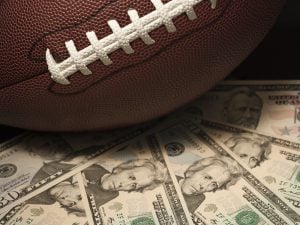Oregon Could Join Florida In Giving College Athletes NIL Rights, Plus An Added Benefit
As of now, six states have NIL laws in place.
 On March 30, the U.S. Supreme Court will hear oral arguments in the case of NCAA v. Alston, which revolves around whether the Ninth Circuit wrongfully decided that the NCAA’s eligibility rules concerning compensation of college athletes violate federal antitrust law. The parties defending the Ninth Circuit decision filed a very compelling brief and hope that, at a minimum, educational-related benefits for college athletes be upheld.
On March 30, the U.S. Supreme Court will hear oral arguments in the case of NCAA v. Alston, which revolves around whether the Ninth Circuit wrongfully decided that the NCAA’s eligibility rules concerning compensation of college athletes violate federal antitrust law. The parties defending the Ninth Circuit decision filed a very compelling brief and hope that, at a minimum, educational-related benefits for college athletes be upheld.
The highest court could go beyond discussing mere educational-related benefits in an opinion. It bears watching whether the justices will make a determination that bleeds into the area of athlete publicity rights (more commonly referred to as name, image, and likeness or NIL rights) as well. In the meantime, many states are getting involved in the process of determining whether they wish to grant athletes such rights irrespective of what the NCAA or the federal government may do on that front.
As of now, six states have NIL laws in place, with Florida leading the pack, boasting a July 1, 2021, effective date. However, 17 more states have sponsored bills that may be debated and passed during this calendar year, with Arizona, Iowa, Mississippi, New Mexico, New York, Pennsylvania, West Virginia and, the most recent state — Oregon — seeking an effective date that either mirrors or comes close to Florida’s.

Legal AI: 3 Steps Law Firms Should Take Now
Oregon’s legislation (Senate Bill 5) would prohibit post-secondary institutions of education, athletic associations, conferences, or organizations with authority over intercollegiate athletes to prevent college athletes from earning compensation for the use of their names, images, and likenesses. It would also allow college athletes in the state to retain representation for procuring and negotiating such compensation.
The legislation does place a restriction on athletes entering into contracts that would conflict with the athletes’ team rules or with the terms of a contract that was entered into between the athletes’ school and a third party unless the athletes’ deliverables are performed when not engaged in official team activities or are strictly based on the use of social media.
The most interesting part of Oregon’s proposal is the revenue-sharing regime contemplated outside of the pure NIL rights granted to athletes. It states,
A post-secondary institution of education, athletic association, conference or organization with authority over intercollegiate sports that enters into a merchandising agreement that covers an intercollegiate sports team and that results in royalty payments to the postsecondary institution of education, athletic association, conference or organization with authority over intercollegiate sports shall include as terms to the agreement: (a) Royalty payments to each student athlete who is a current member of the team. (b) Royalty payments plus a premium to each student athlete who is a current or former member of the team whose name, image or likeness is used.
Sponsored

Navigating Financial Success by Avoiding Common Pitfalls and Maximizing Firm Performance

Is The Future Of Law Distributed? Lessons From The Tech Adoption Curve

The Business Case For AI At Your Law Firm


Is The Future Of Law Distributed? Lessons From The Tech Adoption Curve
This royalty-sharing arrangement is a unique feature not commonly found in other NIL-related proposals. The definition of what constitutes a royalty payment is not explicitly provided in the proposal, and it is not clear whether this language will survive discussions in the legislature when the bill is ultimately debated.
Darren Heitner is the founder of Heitner Legal. He is the author of How to Play the Game: What Every Sports Attorney Needs to Know, published by the American Bar Association, and is an adjunct professor at the University of Florida Levin College of Law. You can reach him by email at heitner@gmail.com and follow him on Twitter at @DarrenHeitner.
Sponsored

Early Adopters Of Legal AI Gaining Competitive Edge In Marketplace








